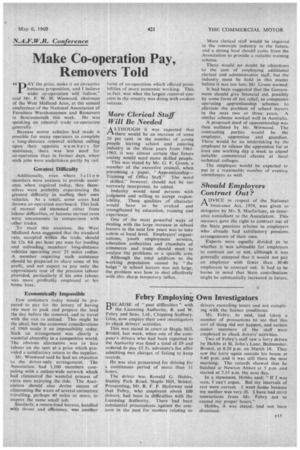Make Co-operation Pay, Removers Told
Page 109

If you've noticed an error in this article please click here to report it so we can fix it.
p
44 AY the price, make it an attractive
business proposition, and I believe wider co-operation will follow." said Mr. P. W. H. Winwood, chairman of the West Midland Area, at the annual conference of the National Association of Furniture Warehousemen and Removers in Bournemouth this week. He was speaking on removal trade co-operation generally.
Because motor vehicles had made it possible for many operators to complete a long-distance removal without calling upon their opposite num he rs for assistance, there was less need for co-operation than in former days, when such jobs were undertaken partly by rail.
Greatest Difficulty
Additionally, even where f ellow members were anxious to provide assistance when required today, they themselves were probably experiencing the greatest difficulty in staffing their own vehicles. As a result, some areas had thrown co-operation overboard. This lack of mutual aid stemmed either from labour difficulties, or because current rates were uneconomic in comparison with other trades.
To meet this situation. the West Midland Area suggested that the standard rate, accepted within the trade, should be 12s. 6d, per hour per man for loading and unloading members' long-distance vehicles operating over 25 miles radius. A member requiring such assistance should be prepared to share some of his profit, and not expect to pay only the approximate cost of the precious labour provided, particularly if his own labour was more profitably employed at his home base.
Economically Impossible
Few customers today would he prepared to pay for the luxury of having two men to pack and prepare the load the day before the removal, and to travel with the van to unload. This might be the ideal, but the economic considerations of 1960 made it an impossibility today. Such an arrangement was clearly a wasteful absurdity in a competitive world. The ,obvious alternative was to hire labour on the spot at a price which provided a satisfactory return to the supplier.
Mr. Winwood said he had no objection to the driver-only arrangement. The Association had 1,100 members competing with a nation-wide network which had eliminated the wasteful process of extra men enjoying the ride. The Association should also devise means of eliminating the waste of several estimators travelling, perhaps 40 miles or more, to inspect the same small job.
Similarly, a return-toad bureau, handled with thrust and efficiency, was another form of co-operation which offered possibilities of more economic working. This, in fact, was what the largest removal concern in the country was doing with evident success.
More Clerical Staff Will Be Needed
ALTHOUGH it was expected that I-1 there would be an increase of some 20 per cent. in the number of young people leaving school and entering industry in the three years from 19611963, it was almost certain that future society would need more skilled people.
This was stated by Mr. a F. Green, a member of the executive council, when presenting a paper, "Apprenticeship— Training of , Office Staff." The word " skilled," however, should not be too narrowly interpreted, he added.
Industry would need persons with judgment and willing to accept responsibility. These qualities of character would have to he evoked and strengthened by education, training and experience.
One of the most powerful ways of dealing with the large increase in school leavers in the next few years was to take action at local level. Employers' organizations, youth employment services, education authorities and chambers of commerce and trade should meet to analyse the problems in a specific area.
Although the total addition to the working population caused by "the bulge" in school leavers was not large, the problem was how to deal effectively with this sharp temporary influx. More clerical staff would be required in the removals industry in the future. and a strong lead should come from the Association to provide a suitable training scheme.
There would no doubt be objections to the cost of employing additional clerical and administrative staff, but the industry must be bold in this matter before it was too late, Mr. Green warned.
It had been suggested that the Government should give financial aid, possibly by some form of tax relief, to companies operating apprenticeship schemes to alleviate the problem of school leavers in the next two or three years. A similar scheme worked well in Australia.
A proposed deed of apprenticeship was then outlined by Mr. Winwood. The contracting parties would be the employer, apprentice and guardian. There would be an undertaking by the employer to release the apprentice for at least one working day a week to attend suitable commercial classes at local technical colleges.
The employee would be expected to put in a reasonable number of eveniiig attendances as well.
Should Employers Contract Out?
A DVICE in respect of the National
Insurance Act. 1959, was given to delegates by Mr. S. Macfarlane, an insurance consultant to the Association. This measure gave the right to contract out of the State pensions scheme to employers who already had satisfactory pensions arrangements of their own, Experts were equally divided as to whether it was advisable for employers to contract out or not, although it was generally accepted that it would not pay an employer with fewer than 30-40 employees to contract out. It had to be borne in mind that State contributiont might be substantially increased in future.




































































































































































































































































